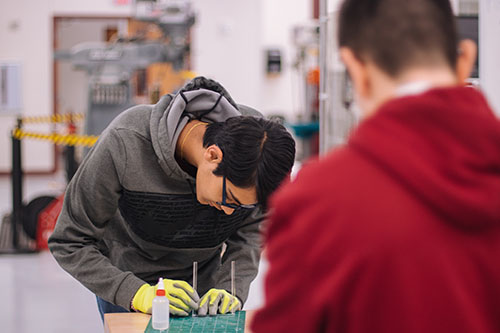Application period for the 2025-26 program year opens January 8, 2025!
Community Impact Grants (previously Local and Collaborative Grants), funded through the federal Library Services and Technology Act (LSTA), help California’s libraries respond effectively to local needs and align services with local community aspirations; support experimentation and research and development in California’s libraries; and provide training and support in grant writing and grant management for the California library community.
Community Impact projects align with Goal 1 of the State Library’s five-year plan, which is to strengthen the ability of California libraries to design equitable programs and services in collaboration with their local communities.
Equity Advisors
Through the Networking Resources in California Libraries partnership project, Community Impact Grant recipients work with trained Equity Advisors to build a shared understanding of equity principles and practices to ensure that programs are designed, implemented, and evaluated with equity at their center.
Fiscal Year 2024-2025 Grantees
Los Angeles Public Library
The library will create, furnish, and promote dedicated sensory spaces for youth at four Los Angeles Public Library branches and provide need-based programming and presentations at each location.
Monrovia Public Library
The Monrovia Public Library (MPL) will create a makerspace and provide STEAM kits for children to help build communication, creativity, and collaboration skills.
Sacramento Public Library
Sacramento Public Library will produce 60 photo books written by California Library Literacy Services (CLLS) tutors and staff to adult learners and library patrons who have few options for appropriate, interesting, and relevant reading materials.
University of California, San Francisco
UCSF Library and community-based partners will co-design the Opioid Crisis Community Archive (OCCA), the first archive documenting how affected communities and community-based service organizations in Northern California have responded to the opioid crisis. UCSF will convene a Community Leadership Working Group, train community members and organizations in archival practices, and co-develop plans for community education, preservation and accessibility of records.
Fiscal Year 2023-2024 Grantees

Benicia Public Library
Created a dedicated space for teens and tweens which enabled underserved community members to access library space, staff, resources and programming during off-school hours.
Glendale Library Arts & Culture
The Public Librarian Diversity Residency Program offered Residency positions for post-graduate librarians, providing first professional job experiences in preparation for long term career success as public librarians.
Monterey County Free Libraries
Older adults with sensory, cognitive, or learning disabilities engaged with library services, prepared for emergencies or disasters, and tried technology and tools for home use.
Moreno Valley Public Library
The MoVal Gamers Lair provided children and teens a safe place to play, experiment, and learn about emerging technologies with hands-on activities and STEAM programs.
Oceanside Public Library
Teens had opportunities to participate in training centered on social justice, engage in community conversations, and create programs and services for the public.
Redwood City Public Library
Library programming, including makerspace activities, career development workshops, and cultural events, were made available to non-English speakers with the help of community members serving as interpreters.
San José Public Library
The Holistic Library Initiative engaged with and supported people who are housing-insecure by providing programming and referrals for basic needs, mental heath services, and legal help.
Sunnyvale Public Library
STEM Sunnyvale enabled girls and participants from culturally diverse communities to access science and technology-based programming, collections, and equipment.
Sutter County Library
Sutter, Colusa and Placer County Libraries collaborated to develop a new model for rural libraries. Through public dialogues, individual interviews and surveys, a report offered recommendations that may be used by libraries as a model that relied heavily on needs expressed by residents of rural communities.
Contact LSTAgrants@library.ca.gov with any questions.

